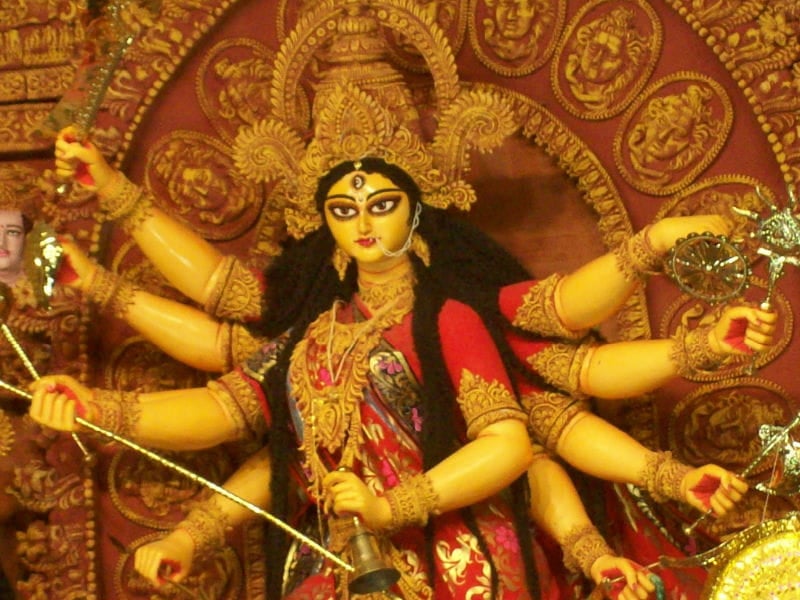No football coach tells us to be moderate in our efforts; few parents encourage their kids to work with equanimity and without seeking rewards. I have to confess that I too urge my kids to try harder, to seek success, to give their all and be nothing but the best, all of which show how far I have strayed from my Hindu roots.
Hinduism values many things--compassion, generosity, truth, charity, daily puja (prayer), visiting temples, chanting, doing your duty, and meditating on the name of the Lord. But above all, Hinduism values balance and equanimity. The Bhagavad Gita, one of the great Hindu texts, is a treatise on yoga (among other things). In the Gita, Lord Krishna describes yoga in many ways--as self-discipline, as detachment, as a daily practice, as nirvana from the sorrows of material life, as a path to higher consciousness. But in the end, he pronounces, "Sammatwam yoga uchathe," which means, "The goal of yoga is balance."
"Sammatwam" in this context means balance, but it also means moderation and equanimity. Yoga should bring the body and mind to an even keel; it should balance our body, mind, psyche and soul. It should help us be moderate in our habits. In simple terms, it is the antithesis of working hard and then playing hard. Rather than indulging in feasts and then fasting or engaging in crash diets; rather than working through the night and day and then drinking yourself to sleep; rather than stressing yourself into a nervous breakdown and then taking medication to bring yourself back on track, this particular aspect of yoga advises you strive for moderation in everything that you do.
My father-in-law practices this in daily life. Dosa is a delicacy in our family. These thin flour crepes and the accompanying chutneys are a spicy dinner favorite. I usually eat eight to ten dosas and then complain of bloating. Even though I don't need to, I can't stop myself.
My father-in-law eats two! When he is tired, he takes a nap. When his stomach gives him trouble, he skips a meal or eats just fruits. He listens to his body and lives a moderate life.
My father-in-law, in other words, is no sanyasi (saint) who has given up the world in order to attain nirvana. Instead, he lives in today's modern world and has learnt to deal with its temptations, ranging from the Internet to chocolate to global travel. He has just learned to say, "No."
Ancient Hindu customs were designed to help people live a moderate life. Most Hindu families are encouraged to fast or eat a light dinner once every two weeks on ekadasi day. They are encouraged to go to bed early and rise before dawn. There is even one night in the year--Shivratri--when people are told to remain sleepless through the night and chant the name of Lord Shiva. Certain foods like garlic and meats are not to be eaten on holy days. As my own father complains good-naturedly, "Between the fast-days and the holy days, there is not a single convenient day in the Hindu calendar for me to indulge in a beer."
Then, there are vraths--vows that Hindus undertake either to achieve something or as penance. A new mother with an extremely sickly child, for instance, might vow to give up salt every Monday as a way of pleading with God to improve her child's health. Others give up sugar in order to achieve a promotion. Some vow that if a job transfer is granted them, they will fast every Tuesday for a month. Some do extreme things like walk on fire or stop speaking entirely just to see if they can.
My father-in-law does none of these things. He doesn't go on extreme juice-fasts or engage in crash diets. He doesn't participate in the feast-then-fast, work-hard-play-hard cycle typical of 21st-century life. He doesn't do asanas or meditate. He doesn't sit in the prayer-room and chant for hours. My father-in-law doesn't do yoga; he lives it.
But I can attempt moderation. On those days when my mornings are crazily busy, I try to take a walk in the afternoon. I have to force myself to take the time to walk on some days, knowing that there is a long list of things waiting for my attention. But the half-hour walk does me good: it gives me equanimity.
I also am trying to watch what I eat, not in a dieting sense, but on a more macro level.
I don't have a list of forbidden foods. I do indulge in the chocolates that I love, but instead of taking four, I try to stop after two. On those days when I can't help eating three, I try not to eat any the next day. I try to balance nights when I simply have to stay up till eleven to watch "Sex in the City" by going to bed with my kids at nine the following day. I occasionally do yoga and try to sit in the prayer room and chant at least once a week. I try to do puja on those days when I am not drinking a glass of wine with dinner!Yoga as moderation is similar to the "middle path" that Buddhism advocates. It's in stark contrast--sadly--to the religious extremism on the rise in India today. Fanaticism is the antithesis of yoga and indeed, of Hinduism, a religion that--in its original state--is moderate in views and embracing of all. The Hinduism advocated by Indian political leaders today seeks to marry the Hindu religion with radical western philosophy, warping both in the process. The only hope for India is if the pendulum swings, as it usually does, bringing the country's political and religious philosophies to a more moderate equilibrium. Until then, it is up to each of us individual Hindus to practice personal moderation in the name of yoga.

